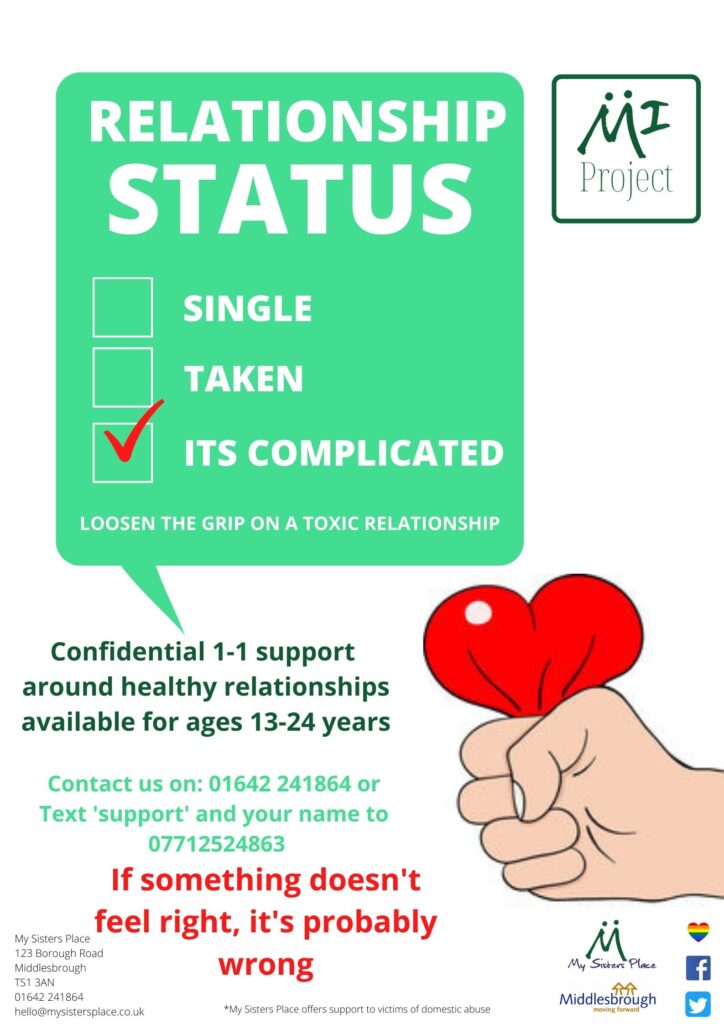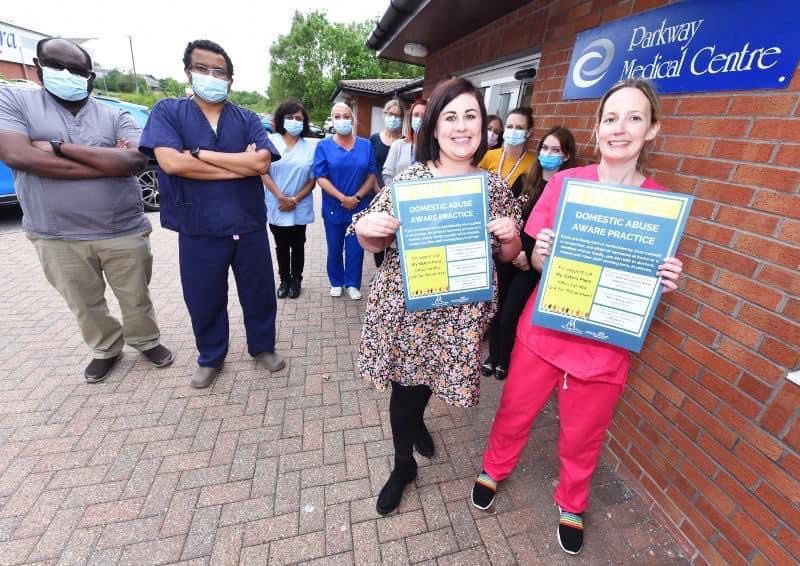Our support workers are here to offer you support and advice to keep safe and will work with you to make informed decisions and explore your options.
Our support workers recognise that telling someone about abuse is not an easy step and they are here to listen to and support you.
“Specialist professional who works with a victim of domestic abuse to develop a trusting relationship. They can help a victim with everything they need to become safe and rebuild their life and represent their voice at a Multi-agency Risk Assessment Conference (MARAC), as well as helping them to navigate the criminal justice process and working with the different statutory agencies to provide wraparound support”
SafeLives, 2023
Our support workers are here to offer you support and advice to keep safe and will work with you to make informed decisions and explore your options.
Our IDVAs are here to help keep you safe. They will listen to you, offer advice, and support you to make informed choices by exploring your options together.
An IDVA’s role is to understand any immediate risks from domestic abuse. They do this by asking some questions using a risk checklist. They will then work with you to create a safety plan and a support plan that meets your needs.
IDVAs offer practical support to help keep you and your children safe. This can include support through the civil courts or the criminal justice system.
They also work with other services to make sure your voice is heard. When needed, an IDVA can speak up for you and advocate on your behalf with different agencies.
Most importantly, our IDVAs understand that talking about abuse is not easy. They are here to listen, believe you, and support you.
We know that not everyone is ready to take action straight away. That’s okay. We will support you to stay safe whether you choose to stay with your partner or decide to leave.
All of our support staff are independent from services like the police, courts, housing, and social care. This means they work for you. When it helps, they can also work with other services to speak up for you and make sure your voice is heard.
We will support and advocate for you in ways that fit your needs and situation. Our main focus is your safety, and we will work with you to help you set and reach your own goals.
Children are victims of domestic abuse too. Seeing or hearing abuse can be just as harmful as being directly abused.
We offer one-to-one support for young people to help them understand their experiences and make informed choices about their relationships. Our support focuses on increasing safety, talking through feelings, and understanding how abuse may be affecting their lives.
This work is led by the young person. It gives them a safe space to explore ideas like power and control, abusive behaviour, and unhealthy or toxic relationships. We also help young people learn what healthy relationships look like and how they should feel.

This service is for young people aged 13 to 24 who are experiencing domestic abuse in their own relationships.
We help young people recognise the signs of domestic abuse and unhealthy relationships, and understand how to respond and stay safe.
A Young Person’s IDVA offers a safe, supportive space to talk. They help challenge harmful stereotypes and beliefs, while building confidence and self-esteem.
We provide advice and support around safety planning, including information about services that can help keep you safe.
With your agreement, the Young Person’s IDVA can work with other professionals to make sure your views, wishes, and feelings are heard.
We understand that not everyone is ready to take action straight away. We will support you to stay as safe as possible, whether you choose to stay in the relationship or leave.
We also know that talking about abuse can be really hard. Our Young Person’s IDVAs are here to listen, support you, and take you seriously.

We are currently offering free workshops to schools and colleges across Middlesbrough.
Each workshop has a focus on exploring healthy and unhealthy relationships; developing knowledge around acceptable behaviours, consent, respect and boundaries. Each workshop can be tailored to the groups individual needs in terms of timing and content.
The workshops are interactive and aim to engage young people in challenging their thinking of what a healthy relationship is. Unfortunately for many young people, they have already had experience of a ‘toxic’ or abusive relationship. The workshops will help to develop their understanding of domestic abuse and the relationship between power and control.


Domestic abuse is the largest single reason for homelessness in Middlesbrough. The scheme provides a preventative approach to resolving homeless issues through early intervention and safety planning.
See this one minute guide for more information.
The Sanctuary Scheme helps people who are at risk of domestic abuse stay safe in their own homes. It is for people who are no longer living with the abuser but may still feel unsafe.
The scheme provides extra security measures to help make your home safer and give you peace of mind.
The Sanctuary Scheme puts victims first. Its aim is to help you stay in your home and feel safe there, if that is what you want.
The Sanctuary Scheme is for people who live in the Middlesbrough Borough Council area and are experiencing domestic abuse. It is for those who are at risk of violence and may become homeless without extra support and safety measures.
The scheme is open to people living in council housing, private rented homes, housing association homes, or their own home.
To be eligible, the home must be legally in the applicant’s name. If the property is rented, the scheme must also have permission from the landlord before any work can be carried out.
The scheme is run as a partnership with the Sanctuary Scheme Co-ordinator based at My Sisters Place working closely with Crime Prevention Team at Cleveland Police, Cleveland Fire Brigade. The scheme is funded by Middlesbrough Council.
If a referring agency is satisfied that without the work the victim would be at risk of harm and likely to become homeless a Sanctuary Referral Form is completed and submitted to admin.msp@msp.cjsm.net or reception@mysistersplace.co.uk, together with a Risk Assessment Checklist.

Economic Abuse support workers provide practical support to survivors of domestic abuse and work alongside the IDVA team. The support entails many of areas of support a client may need to live safely and independently, including housing support needs and financial issues.
Domestic abuse is a health issue, and we recognise that domestic abuse has devasting health impacts affecting both the physical and mental health of victims and survivors of domestic abuse and their children.
My Sister’s Place is proud to deliver the IRIS Programme in Middlesbrough and since the launch in 2021 it has transformed the way that My Sisters Place and primary care professionals in Middlesbrough work together to support their patients who are impacted by domestic abuse.

General Practice plays an integral role in addressing the issue of and transforming responses to domestic violence and abuse.
The IRIS (Identification and Referral to Improve Safety) is a collaboration between primary care and third sector organisations specialising in domestic abuse.
The IRIS Programme provides training, support, referral, and advocacy model to support General Practice to better support their patients affected by domestic abuse.
The training ensures that General Practice staff are equipped to confidently respond to domestic abuse which will essentially improve the safety, quality of life and wellbeing of their patients who are victims and survivors of domestic abuse.
It is aimed at women who have experienced or who are experiencing domestic abuse from a current partner, ex-partner or adult family member and provides information and signposting for male victims and for perpetrators.
We know that victims/survivors of abuse trust Health Professionals and 80% of women in a violent relationship seek help from health services and these are often a woman’s first, or only, point of contact (Department of Health).
Victims and Survivors will often attempt to disclose during a consultation, half of women that access domestic abuse specialist support services have visited a GP practice an average of 4.6 times in the 12 months before they accessed specialist domestic abuse services (SafeLives 2016).
The programme provides two specialist members of staff, the Advocate Educator (a specialist domestic abuse advocate from My Sisters Place) and the Clinical Lead (a GP) who work together to train practices about domestic violence and abuse.
Our Advocate Educator with the support of the Clinical Lead, will deliver training and support for each IRIS practice in the Middlesbrough area to GPs and clinicians. Training and support are also provided to all frontline staff including Reception Staff.
The training focuses on providing information on how to recognise and identify domestic abuse through clinical enquiry and how to respond in terms of assessing immediate risk, how to record this information and to refer patients for specialist support.
Once each practice has received training, the practice becomes a domestic abuse aware practice. This is recognised and promoted to patients by the displaying of posters and information on social media.
The role of the Advocate Educator at My Sisters Place is to also provide advocacy and emotional support to patients whilst identifying risk, implementing safety plans and signposting to other services if necessary and acts as a named contact for patient referrals made via the IRIS programme.
IRIS trained practices are ‘domestic abuse aware’ and are a safe place to disclose abuse and access support.
We currently have 15 domestic abuse aware practices in Middlesbrough:
Please speak to your GP Surgery if you would like a referral to IRIS.
If you are a GP practice and you would like to become a domestic abuse aware practice, or for more information on IRIS please contact our IRIS Advocate Educator, Leanne Smith by e-mailing, leanne.smith@mysistersplace.co.uk

In 2022 Leanne Smith (Advocate Educator/Project Lead) and Dr Jen Standen (Clinical Lead) were awarded the Healthwatch Community Innovator Award for the work delivering the IRIS programme.

Leanne Smith (Advocate Educator/Project Lead) and Dr Jen Standen (Clinical Lead) along with colleagues at Parkway Medical Centre who were our first domestic abuse aware practice in Middlesbrough.

We understand how difficult it can be if you are a man experiencing domestic abuse or other forms of violence. You might feel scared, isolated, and confused. You might feel ashamed or afraid to tell anyone about your situation. But you are not alone – there is support available, we will believe you, we will support you. Get in touch.
You can also contact Domestic Abuse Helpline for Men | Men’s Advice Line UK (mensadviceline.org.uk) or Menkind Help For Male Victims – ManKind Initiative 01823 334 244 a national helpline a specialist provider for men experiencing domestic abuse.